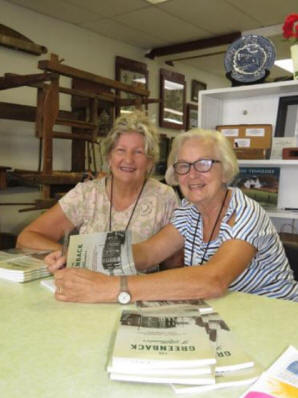Linda Braden Albert thedailytimes.com
 Close-knit
communities have their own unique stories to tell of people,
places and events, and thanks to the efforts of Judy
Franklin Hudson, a small sampling of these stories of the
small town of Greenback are now preserved.
Close-knit
communities have their own unique stories to tell of people,
places and events, and thanks to the efforts of Judy
Franklin Hudson, a small sampling of these stories of the
small town of Greenback are now preserved.Franklin’s book, “The Greenback I Remember … A Century of Stories of a Unique Tennessee Town from 1900 to 2000,” was hot off the press when she held her initial book signing and sale July 12 at the Greenback Heritage Center, where she volunteers. In a few short hours, more than 125 copies were sold, old friends were greeted and new friends made as Hudson smiled, chatted and inscribed each book with her name and a short personalization.
Telling the tales
As a volunteer with the Greenback Heritage Museum, Hudson found a plethora of stories as she perused the written materials in the museum during times when no visitors were present.
“I thought, you know, I have time to sit here and do this, but other people, they drop in but they don’t get the whole story,” Hudson said. “They don’t know what all is here, and the only way we can get that out to them is to put it in something they can put in their hands and carry out the door with them. So that’s why I wrote the book, to get some of these stories down before the next generation forgets there was a Greenback. It’s such a different place now from what it used to be.”
In addition to using donated materials found in the museum such as scrapbooks, newspaper articles that date from 1917 and other written reminiscences, letters, etc., Hudson recounts stories she and others, including her husband and her late father-in-law, Shag Hudson, both described as “born storytellers,” have told about Greenback and the people who lived there. She interviewed several people, one of whom was the late Frank Brannon.
‘Fun stories’
Hudson said one of the stories that she particularly liked happened in 1924 and concerned the town’s blacksmith.
“Mr. Clarence Long, who was the blacksmith here in town, once shod a zebra,” she said. “When the circus came through town, he actually put shoes on a zebra. That’s what I enjoyed learning about the most. Most of these stories I’ve known forever and I’ve heard them over and over, but that was a new one on me.”
The book ends with some stories from the late Fred Fipps.
“You can’t tell about Greenback and not tell a Fred Fipps story,” Hudson said. “He was Greenback’s greatest storyteller.”
The stories in the book are from 1900 up to about 2000 and range from Halloween pranks to colorful characters and even a story of why Greenback, which was once in Blount County, shifted to Loudon County. The book is not intended to be a history book. As Hudson writes, its purpose is to amuse, entertain and give others food for thought as well as to preserve the stories that make the people of Greenback who they are.
“Don’t expect a lot of historical facts,” the author said. “It’s just a lot of fun stories.”